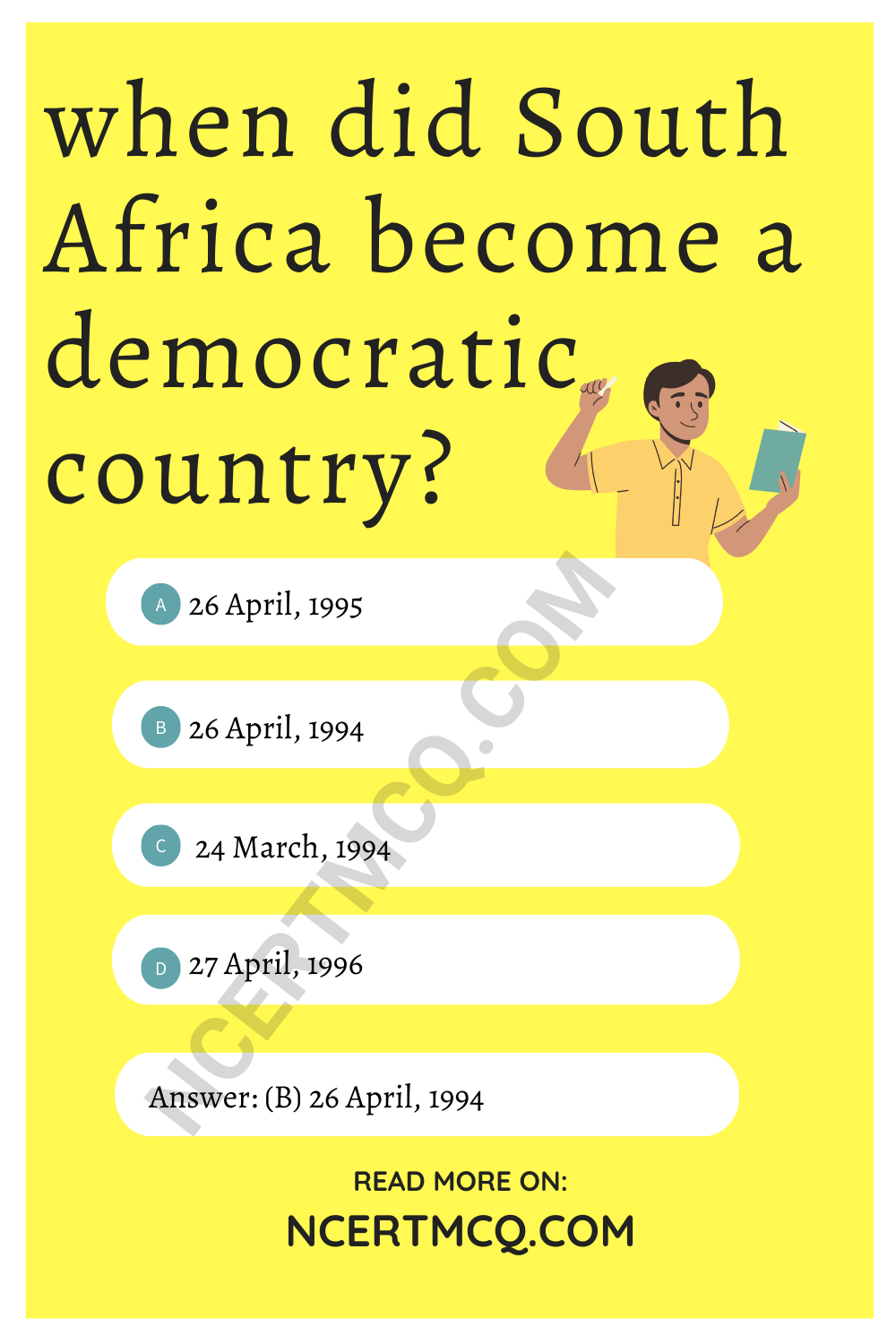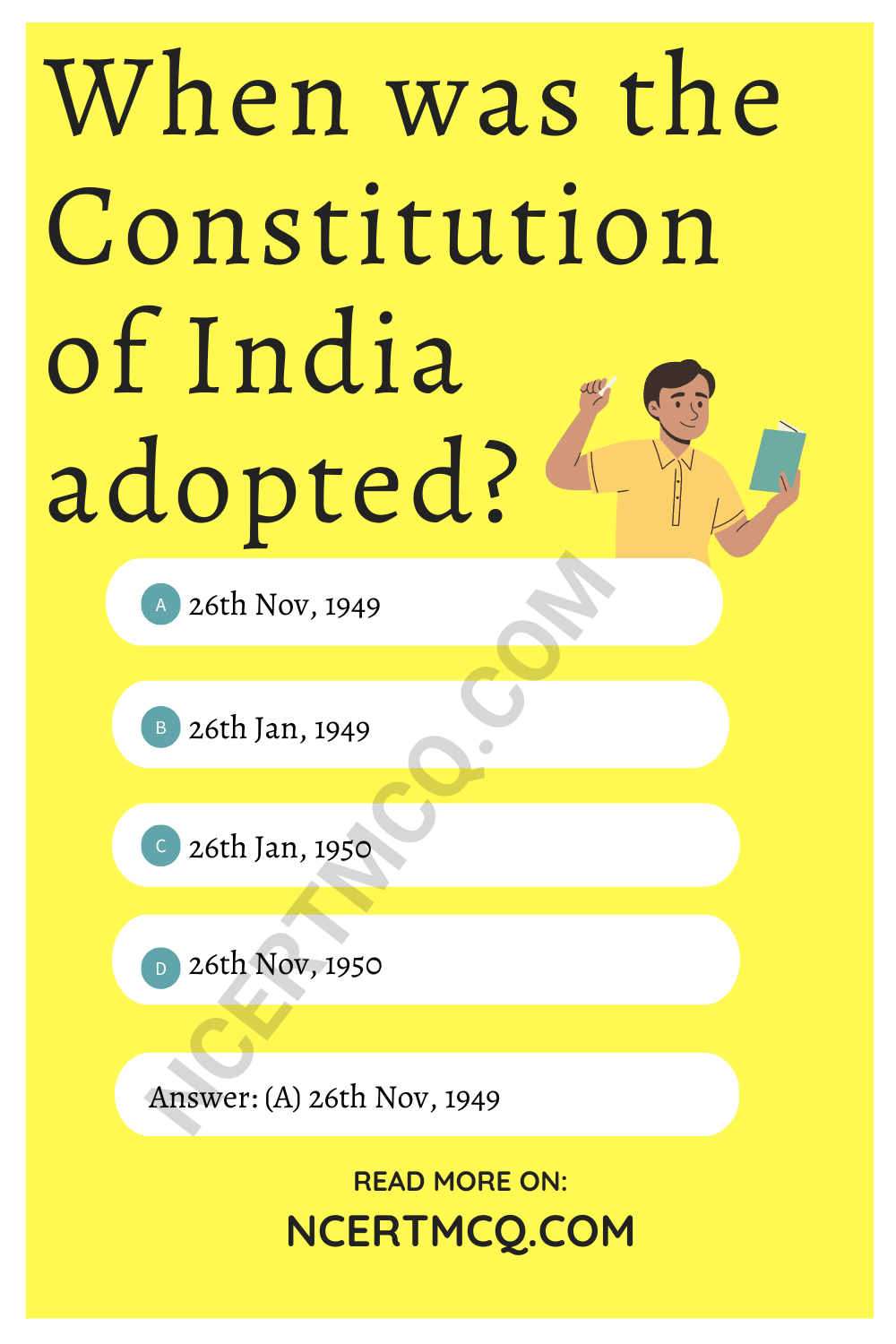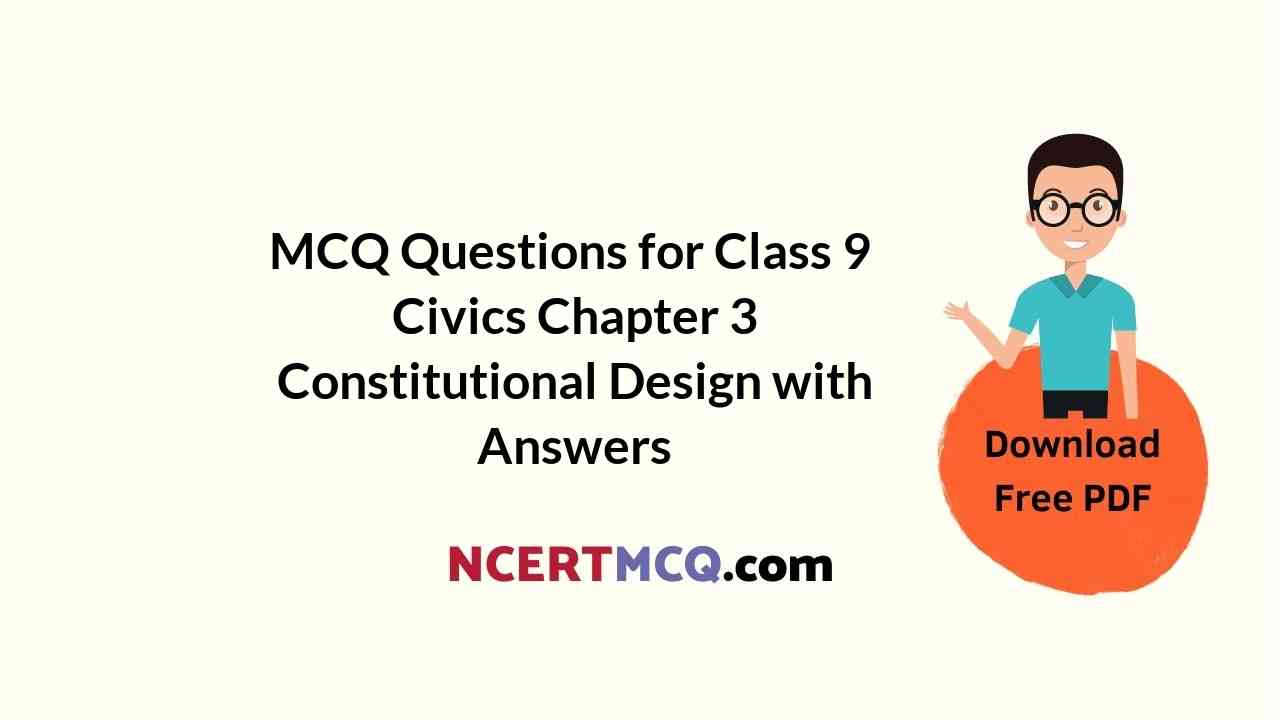Check the below Online Education NCERT MCQ Questions for Class 9 Civics Chapter 3 Constitutional Design with Answers Pdf free download. MCQ Questions for Class 9 Social Science with Answers were prepared based on the latest exam pattern. We have Provided Constitutional Design Class 9 Civics MCQs Questions with Answers to help students understand the concept very well. https://ncertmcq.com/mcq-questions-for-class-9-social-science-with-answers/
Class 9 Social Science Civics Chapter 3 MCQ With Answers
Civics Class 9 Chapter 3 MCQs On Constitutional Design
Choose the correct option:
Constitutional Design Class 9 MCQ Question 1.
The Constituent Assembly adopted the Constitution of India on
(a) 26 January 1950
(b) 26 November 1949
(c) 26 January 1949
(d) 15 August 1947
Answer
Answer: (b) 26 November 1949
Constitutional Design Class 9 MCQ With Answers Question 2.
Which of the following sentences is wrong about Dr B.R. Ambedkar?
(а) He was the Chairman of the Drafting Committee.
(b) He was born in Maharashtra.
(c) He was law minister in post-independence India.
(d) He was the founder of the Republican Party of India.
Answer
Answer: (b) He was born in Maharashtra.
Class 9 Constitutional Design MCQ Question 3.
Who among the following was not the member of the Constituent Assembly?
(a) Mahatma Gandhi
(b) Rajendra Prasad
(c) T.T. Krishnamachari
(d) Pt. Jawaharlal Nehru
Answer
Answer: (a) Mahatma Gandhi
Class 9 Civics Chapter 3 MCQ With Answers Question 4.
Nelson Mandela remained in the jail for
(a) 28 years
(b) 29 years
(c) 30 years
(d) 31 years
Answer
Answer: (a) 28 years
Class 9 Civics Chapter 2 MCQ With Answers Constitutional Design Question 5.
Apartheid in South Africa was discrimination on the basis of
(a) gender
(b) religion
(c) race
(d) economic status
Answer
Answer: (c) race
Class 9 Civics Chapter 2 Constitutional Design MCQs With Answers Question 6.
How many members had the Constituent Assembly that wrote the Indian Constitution?
(a) 200
(b) 199
(c) 198
(d) 190
Answer
Answer: (b) 199
MCQ On Constitutional Design Class 9 Question 7.
Which of the following terms is not included in the Preamble to the Indian Constitution?
(a) Liberty
(b) Equality
(c) Secular
(d) Religion
Answer
Answer: (d) Religion
MCQ Of Civics Class 9 Chapter 2 Constitutional Design Question 8.
The Indian Constitution came into effect on
(a) 26 January 1949
(b) 26 January 1950
(c) 26 January 1952
(d) 26 November 1950
Answer
Answer: (b) 26 January 1950
Class 9 Civics Chapter 3 MCQ Question 9.
On what charges was Nelson Mandela sentenced to life imprisonment?
(a) For treason
(b) For breaking the laws
(c) For corruption charges
(d) for possessing illegal property
Answer
Answer: (a) For treason
MCQ Of Constitutional Design Class 9 Question 10.
In which way did the system of apartheid discriminate among the South Africans?
(a) Restricted social contacts between the races
(b) Segregation of public facilities
(c) Created race-specific job categories
(d) All the above
Answer
Answer: (d) All the above
Constitutional Design MCQ Class 9 Question 11.
why did the white regime decide to change its policies?
(a) Increase in protests and struggles
(b) Government realised that repression was becoming difficult
(c) Rise of sympathetic attitude in government for the blacks
(d) Both (a) and (b)
Answer
Answer: (d) Both (a) and (b)
Ch 3 Civics Class 9 MCQ Question 12.
when did South Africa become a democratic country?
(a) 26 April, 1995
(b) 26 April, 1994
(c) 24 March, 1994
(d) 27 April, 1996
Answer
Answer: (b) 26 April, 1994

MCQ Questions For Class 9 Civics Chapter 2 Constitutional Design Question 13.
Name the autobiography of Nelson Mandela.
(a) The Long Walk to Freedom
(b) South Africa Wins Freedom
(c) Walk to Freedom
(d) Our Freedom
Answer
Answer: (a) The Long Walk to Freedom
Class 9 Civics Ch 3 MCQ Question 14.
what did the white minority want from the new Constitution?
(a) Protect its privileges and property
(b) A separate country for themselves
(c) Reservation in legislature
(d) some special rights
Answer
Answer: (a) Protect its privileges and property
Class 9 Civics Constitutional Design MCQ Question 15.
which of the following sentences is correct?
(a) All countries that have constitutions are necessarily democratic
(b) All countries that are democratic necessarily have constitutions
(c) Both (a) and (b)
(d) None of the above)
Answer
Answer: (b) All countries that are democratic necessarily have constitutions
Question 16.
Where was the 1931 session of Indian National Congress held?
(a) Nagpur
(b) Karachi
(c) Calcutta
(d) Delhi
Answer
Answer: (b) Karachi
Question 17.
According to which Act were the elections held to provincial legislatures in India in 1937?
(a) Government of India Act, 1935
(b) Government of India Act, 1919
(c) Government of India Act, 1909
(d) None of the above
Answer
Answer: (a) Government of India Act, 1935
Question 18.
which revolution in the world inspired the Indians to set up a socialist economy?
(a) French Revolution
(b) Turkish Revolution
(c) Russian Revolution
(d) American War of Independence
Answer
Answer: (c) Russian Revolution
Question 19.
when did the Assembly adopt the Constitution?
(a) 26 November, 1949
(b) 26 December, 1949
(c) 26 January, 1950
(d) 26 January, 1949
Answer
Answer: (a) 26 November, 1949
Question 20.
How many amendments were considered before adopting the Constitution?
(a) Around 500
(b) Around 2000
(c) Around 1550
(d) Around 1000
Answer
Answer: (b) Around 2000
Question 21.
Who among these leaders was a bitter critic of Mahatma Gandhi?
(a) Maulana Abul Kalam Azad
(b) Sarojini Naidu
(c) Dr. B.R. Ambedkar
(d) Dr. Rajendra Prasad
Answer
Answer: (c) Dr. B.R. Ambedkar
Question 22.
The Constitution begins with a short statement of its basic values. What is it called?
(a) Preface
(b) Preamble
(c) Introduction
(d) Article
Answer
Answer: (b) Preamble
Question 23.
which of these countries is/are examples of a Republic?
(a) USA
(b) India
(c) South Africa
(d) All the above
Answer
Answer: (d) All the above
Question 24.
which of these positions is correct in relation to the ‘Sovereign’ status of India?
(a) USA can decide India’s foreign policy
(b) USSR can support the CPI (M) in setting up its government here
(c) The Indian government only can decide its internal and external policies
(d) Pakistan can control India’s Armed Forces
Answer
Answer: (c) The Indian government only can decide its internal and external policies
Question 25.
which of the following days is celebrated to mark the enforcement of the constitution?
(a) Republic Day
(b) Independence Day
(c) Gandhi Jayanti
(d) Constitution Enforcement Day
Answer
Answer: (a) Republic Day
Question 26.
The Constituent Assembly met for how many days?
(a) 114
(b) 280
(c) 365
(d) 150
Answer
Answer: (a) 114
Question 27.
When did the Indian constitution come into force?
(a) 26th Nov, 1949
(b) 15th August, 1947
(c) 26th Jan, 1950
(d) 26th Jan, 1930
Answer
Answer: (c) 26th Jan, 1950
Question 28.
When was the Constitution of India adopted?
(a) 26th Nov, 1949
(b) 26th Jan, 1949
(c) 26th Jan, 1950
(d) 26th Nov, 1950
Answer
Answer: (a) 26th Nov, 1949

Match the Following:
| Column A | Column B |
| 1. Kanhaiyalal Maniklal Munshi | a. Captain of the first national hockey team |
| 2. Jawaharlal Nehru | b. Leader of the Communist Party of India |
| 3. Somnath Lahiri | c. Three times the president of Congress |
| 4. Baldev singh | d. Founder of the Swatantra Party |
| 5. Jaipal Singh | e. Education Minister in the first union cabinet |
| 6. Rajendra Prasad | f. Defence Minister in the union cabinet |
| 7. Abul Kalam Azad | g. Advocate of socialism, democracy and anti-imperialism |
Answer
Answer:
| Column A | Column B |
| 1. Kanhaiyalal Maniklal Munshi | d. Founder of the Swatantra Party |
| 2. Jawaharlal Nehru | g. Advocate of socialism, democracy and anti-imperialism |
| 3. Somnath Lahiri | b. Leader of the Communist Party of India |
| 4. Baldev singh | f. Defence Minister in the union cabinet |
| 5. Jaipal Singh | a. Captain of the first national hockey team |
| 6. Rajendra Prasad | c. Three times the president of Congress |
| 7. Abul Kalam Azad | e. Education Minister in the first union cabinet |
We hope the given NCERT MCQ Questions for Class 9 Civics Chapter 3 Constitutional Design with Answers Pdf free download will help you. If you have any queries regarding Constitutional Design CBSE Class 9 Civics MCQs Multiple Choice Questions with Answers, drop a comment below and we will get back to you soon.
Class 9 Social Science Civics MCQ:
